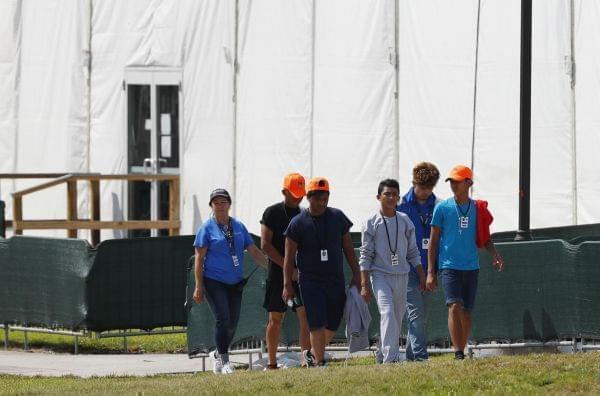IWU Professor Finds ‘Shocking’ Conditions At U.S. Immigration Facilities

Migrant children walk outside the Homestead Temporary Shelter for Unaccompanied Children in May in Homestead, Fla. Wilfredo Lee/AP
Kathleen O’Gorman spent her summer on the front lines of America’s broken immigration system.
The Illinois Wesleyan University English professor interviewed children being held at U.S. immigration facilities on behalf of the Center for Human Rights and Constitutional Law.
Their mission is to determine whether the U.S. government is abiding by the Flores settlement, a 1990s-era decree that governs how we treat minors who’ve immigrated to this country.
O’Gorman and her daughter volunteered for the job last year after reports emerged about children being separated from their families and detained in poor conditions.
“It’s worse than everything you heard. It was shocking. It was really difficult to spend time in those facilities for many reasons. Emotionally, it was very, very difficult to continue the conversations when you knew, because of what the children were saying, what the conditions were,” said O’Gorman, who is fluent in Spanish.
O’Gorman has made six different visits—she pays for her own travel out of pocket—to U.S. immigration facilities, starting last year. This summer was the first time O’Gorman got to see the U.S. Customs and Border Protection facilities, where their team wanted to see how the youngest children were fairing. They were kept “very, very carefully controlled” in conference rooms and unable to inspect other parts of those facilities, O’Gorman said.
“One of the things that doesn’t show up in all the (media reporting) is that the toilets in many of the cages are in the middle of the cage. And there’s no privacy,” O’Gorman said. “So these children, every single day, multiple times a day, are humiliated by their own bodies by that lack of privacy and lack of dignity. Imagine what a teenage girl is experiencing in that condition. She gets her period. How do you manage that in public, in effect?”
At Illinois Wesleyan, O’Gorman is passionate about travel and study abroad opportunities. She was an exchange student as a senior in high school, spending a year in Bogota, Colombia. That’s where her passion for Latin America came from, and it's where she learned Spanish.
She considers herself a citizen of the world. Her experiences interviewing children who’ve crossed into the U.S. have shaken her.
“My experiences really do validate in ways that I never expected the worst of what humans are capable of,” O’Gorman said. “It was clear to me that cruelty was the point.”
O’Gorman offers this disclosure: She is speaking for herself, not on behalf of the Los Angeles-based Center for Human Rights and Constitutional Law.
Links
- Pritzker Says New Laws Make Illinois ‘Firewall’ Against Trump On Immigration
- How Foreign-Born Doctors Help Refugees, Other Immigrants
- Judge: Immigration Must Identify Thousands More Migrant Kids Separated From Parents
- Immigration Activism Focus Of Upcoming Symposium In Champaign
- Champaign-Urbana Schools Seeking Mentors To Support Immigrant Children
- C-U Immigrant Organizations Concerned About Proposed Changes To “Public Charge” Rule
